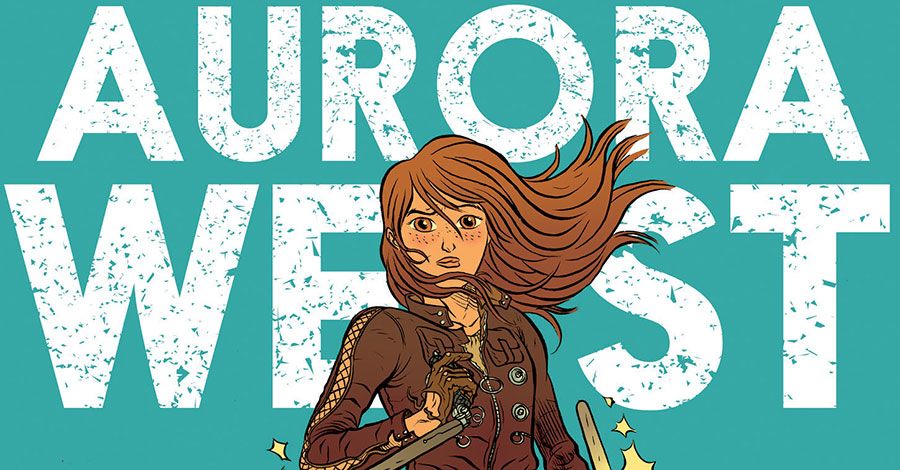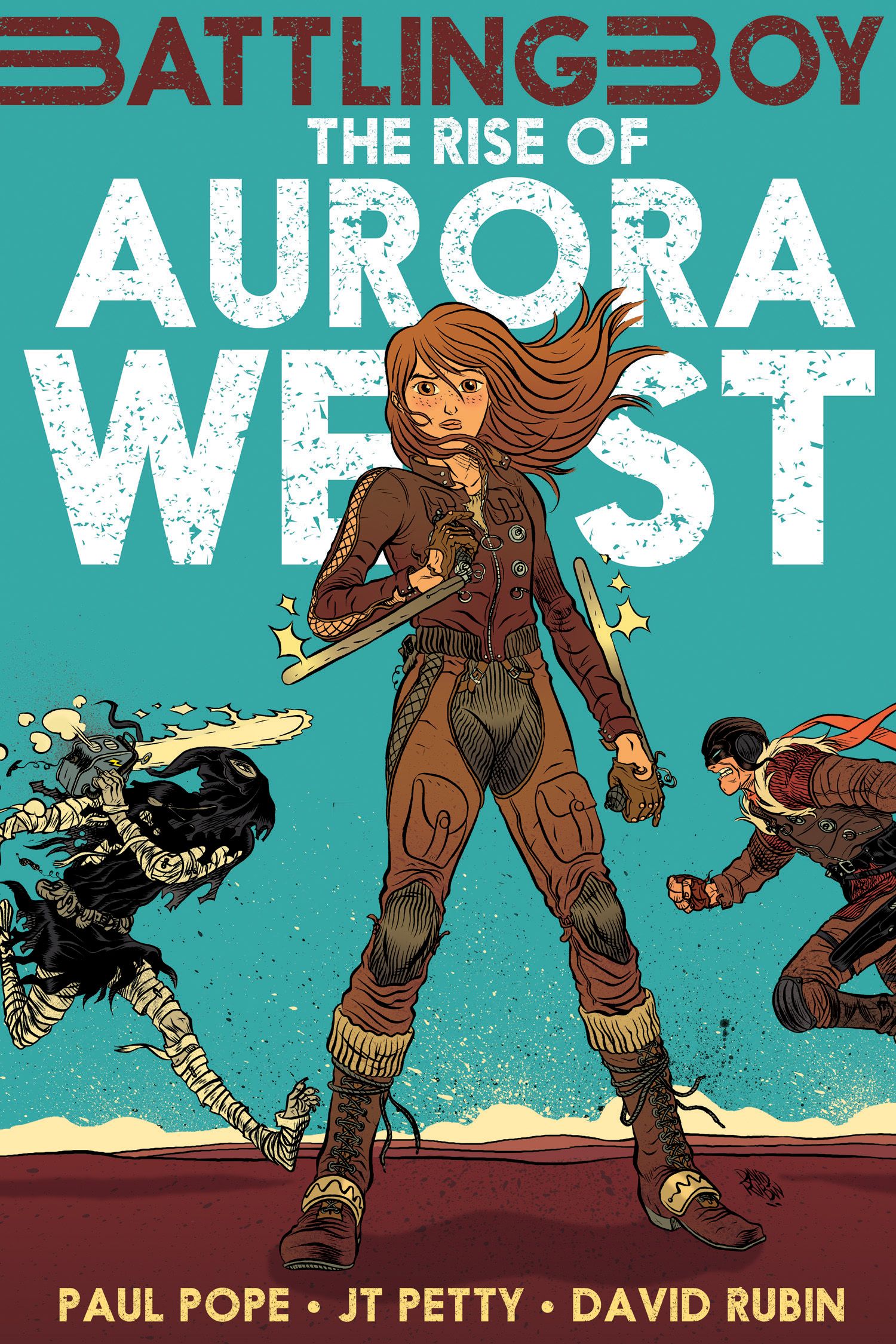Last fall, Paul Pope released his all-ages graphic novel "Battling Boy" through First Second, following the adventures of a kid savior traveling to a distant planet to grow into the hero he's destined to be. With Acropolis in the wake of losing their former hero, Haggard West, giant monsters are overrunning the town and it's up to Battling Boy to stop them -- except he's not really the next in line for the job. Aurora West, daughter of Haggard, has spent her entire life preparing to protect her city. With her father's passing, the mantle should rightly be passed to her. Aurora is disciplined, skilled and brilliant -- but how can she compete with a god?
RELATED: Paul Pope's Recipe For Making "Battling Boy"
Pope was so taken with the character of Aurora West that he planned to revisit her origins in two companion pieces, the first of which is set for a September release. "The Rise of Aurora West" sees the young hero from childhood through the loss of her parents, diving deeper into the world of a developing heroine. Pope partnered with co-writer J.T. Petty and artist David Rubin to continue Aurora's story, hoping to make the world of Battling Boy a place for other creators to tell stories and explore.
Fresh off his Eisner win for "Battling Boy" as the Best Publication for Teens, Pope spoke with CBR News about his shift into all-ages comics, his hopes for the expanding world of the series and what kept him coming back to Aurora West.
CBR News: Paul, when you started "Battling Boy" did you have an idea that you'd want to continue with Aurora West?
Paul Pope: I really fell in love with her as a character as I was working on the series. We had a film and a graphic novel at the same time, so I had to make a story bible with a through line for the entire series. I knew early on what was going to be the main story and as I worked on it, I was thinking through her personality to make the story watertight. When it looked like "Battling Boy" was doing well and I sat down with my editors, they asked if I had any other ideas for stories in this universe. I wanted to do the story of Haggard and Aurora -- what happened to the mom? What did they do before a god arrived?
I love old pulp fiction and silent films, Universal serials, "Flash Gordon," RKO, all of that stuff. I wanted something that felt very 1930s/1940s.
Is that where the Egyptology aspect we see in Aurora's story comes in?
Yeah. It's cool because the "Battling Boy" world is science fiction, but its not Earth. I wanted to create an alternate history for this alternate Earth. I love things like Egyptology. I'm into Carl Jung, so I like dream analysis and symbolism.
For "Battling Boy" I started doing research on the monsters and got into a lot of Victorian and early 20th century horror writers like Algernon Blackwood, H.P. Lovecraft, Lord Dunsany. It really gave me respect for how they approached gothic horror. I wanted a little bit of that in "Aurora West."
As you were writing Aurora, what characteristics were coming out that you fell in love with?
Battling Boy has typical boy interests and fears; he's a little bit aloof. He's not human. Aurora's motivation is revenge. She very much fits into that classic hero role, avenging the death of her parents. She's angry. Battling Boy is serene and she has more anger, and they have a rivalry because he's the hero and she wants to be. In the second Battling Boy book, we get a lot more into their relationship and how they have to form an alliance.
When did the open aspect of the series come into play, with you inviting other creators to tell Battling Boy stories?
I started with an initial idea that I wanted to have a kickass comic that had a kid superhero fighting monsters. I was toying with a few different directions, and I knew there had to be another kid super hero. I wasn't sure if it was going to be a bad kid or a good kid, though. Before Aurora it was a kid vampire who was like a princess, but over time I fell more in love with the idea of a science super hero. It's more real. There's a lot of stuff with "Battling Boy" that I had to throw out because it was going too far into fantasy and becoming an unrelatable story.
Right, and with your interest in symbolism and iconography, it seems like it would be really important for you to create characters the reader can imprint upon and experience the story through.
Exactly. That's why Battling Boy is called "Boy" and his parents are "Mom" and "Dad" and his uncle is "Uncle." They are universal that way. His parents are gods but his dad isn't Thor or something, it's an unspecified god.
How did you come to work with J.T and David?
Calista Brill is the editor on the series, and we all sat down together initially. I told them what I wanted to do with the story and gave J.T. a stack of movies to watch: "Mask of Fu Manchu," all of the Flash Gordon serials, a lot of lurid horror and sci-fi stuff from the 30s and earlier. Then JT and I spent about three months hammering out the story, and then we got David going. I would do a lot of art direction for him. In the case of Haggard, because we finally see him without his mask on, I wanted him to look like a cross between Johnny Cash and Robert Mitchum. And he nailed it.
I asked J.T. to try and not create too many things that aren't in the story bible, so he played with what I gave him. There are a couple of interesting new monsters he created, though. It was a little difficult getting the cute factor right on Aurora, though.
What was important about her appearance to you?
I think of her as looking like a young Jodie Foster or Sissy Spacek. It took a long time to get her right -- she was a little too old at first. The challenge is that the book takes place over the course of years, from her as a baby through adulthood.
Another thing: when I had to kill Haggard, which was necessary for the Battling Boy series, I regretted it. He's such a good character with so much potential, so I was really happy when I had the chance to do the second book and had more time with him.
There are two Aurora books and they tell the complete story of her life up until she meets Battling Boy. The Battling Boy books take place in basically two weeks, where Aurora's are about fifteen years.
Are there other characters in the world that you'd like to pursue?
Yeah, we talked about if the reception is good on this, maybe the scribbly monster in "Battling Boy," the big boss? There's a lot to him that will come out in the Aurora series. This world has the realm of the gods, the realm of the monsters and the human realm, which has been established as many planets.
One of the things I loved about "Battling Boy" and "Aurora West" is that you do include an element of fear and the characters have to experience it. Even though you're writing for kids, you don't neglect that their world is a scary place. What boundaries did you draw?
Yeah, you're right. Kids know they're not safe. The first scene, almost the first page I was drawing in "Battling Boy," was a battle where he destroys a tank. If I was doing what I would normally do there would be dead bodies and stuff. So I just made the decision that there wouldn't be any swearing, no drugs, and not too much violence. One thing I got from Hollywood is that it's okay for there to be blood as long as its monster blood.
"Battling Boy: The Rise of Aurora West" arrives September 30 from First Second.


